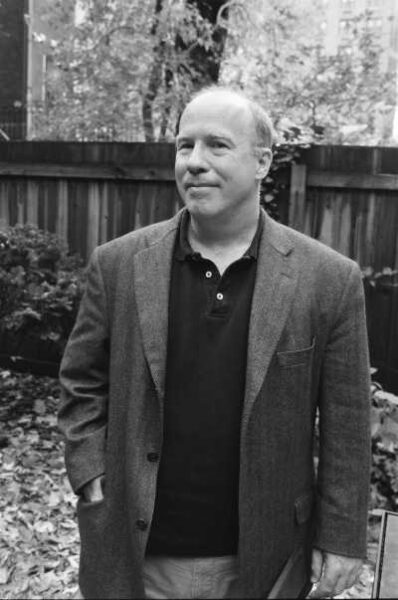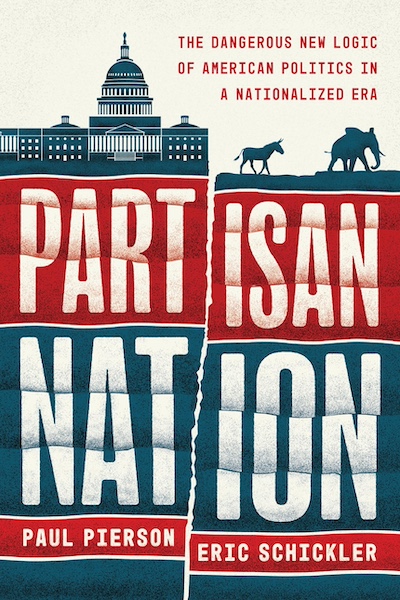Please join us on Wednesday, October 9 at 4pm for an Authors Meet Critics panel on the book Partisan Nation: The Dangerous New Logic of American Politics in a Nationalized Era, by Paul Pierson and Eric Schickler. The authors will be joined in conversation by Francis Fukuyama, the Olivier Nomellini Senior Fellow at Stanford University’s Freeman Spogli Institute for International Studies (FSI) and a faculty member of FSI’s Center on Democracy, Development and the Rule of Law (CDDRL), and Didi Kuo, a Center Fellow at the Freeman Spogli Institute for International Studies (FSI) at Stanford University. Mark Danner, Professor at the UC Berkeley School of Journalism, will moderate.
The Social Science Matrix Authors Meet Critics book series features lively discussions about recently published books authored by social scientists at UC Berkeley. For each event, the author discusses the key arguments of their book with fellow scholars. These events are free and open to the public.
About the Book
A provocative exploration of how America’s democratic crisis is rooted in a dangerous mismatch between our Constitution and today’s nationalized, partisan politics.
The ground beneath American political institutions has moved, with national politics subsuming and transforming the local. As a result, American democracy is in trouble.
In this paradigm-shifting book, political scientists Paul Pierson and Eric Schickler bring a sharp new perspective to today’s challenges. Attentive to the different coalitions, interests, and incentives that define the Democratic and Republican parties, they show how contemporary polarization emerged in a rapidly nationalizing country and how it differs from polarization in past eras. In earlier periods, three key features of the political landscape—state parties, interest groups, and media—varied locally and reinforced the nation’s stark regional diversity. But this began to change in the 1960s as the two parties assumed clearer ideological identities and the power of the national government expanded, raising the stakes of conflict. Together with technological and economic change, these developments have reconfigured state parties, interest groups, and media in self-reinforcing ways. The result is that today’s polarization is self-perpetuating—and intensifying.
Partisan Nation offers a powerful caution. As a result of this polarization, America’s political system is distinctly and acutely vulnerable to an authoritarian movement emerging in the contemporary Republican Party, which has both the motive and the means to exploit America’s unusual Constitutional design. Combining the precision and acuity characteristic of their earlier work, Pierson and Schickler explain what these developments mean for American governance and democracy.
About the Authors

Paul Pierson is the John Gross Distinguished Professor of Political Science at Berkeley, where he also directs the newly established Berkeley Economy and Society Initiative (BESI). Pierson is the author or co-author of six books and numerous journal articles, along with a wide range of popular writings on American politics and public policy. Four of his books have been co-authored by Jacob Hacker. Their latest book is Let Them Eat Tweets: How the Right Rules in an Age of Extreme Inequality. Previously, the two wrote American Amnesia: How the War on Government Led Us to Forget What Made America Prosper—a New York Times Book Review Editor’s Choice, and Winner-Take-All Politics: How Washington Made the Rich Richer and Turned Its Back on the Middle Class. Prior to this Pierson wrote Politics in Time: History, Institutions and Social Analysis (2004) and Dismantling the Welfare State? Reagan, Thatcher and the Politics of Retrenchment (1994). Material from each of these books received major prizes from the American Political Science Association. A former Guggenheim Fellow and a member of the American Academy of Arts and Sciences, his recent honors include election to the American Academy of Political and Social Science as the 2022 Robert A. Dahl Fellow.

Eric Schickler is the Jeffrey & Ashley McDermott Professor of Political Science and co-Director of the Institute of Governmental Studies at the University of California, Berkeley. He studies American politics, with a focus on the U.S. Congress, American political development, political parties, and polarization. He is the author of three books which have won the Richard F. Fenno, Jr. Prize for the best book on legislative politics: Disjointed Pluralism: Institutional Innovation and the Development of the U.S. Congress (2001), Filibuster: Obstruction and Lawmaking in the United States Senate (2006, with Gregory Wawro), and Investigating the President: Congressional Checks on Presidential Power (2016, with Douglas Kriner; also winner of the Richard E. Neustadt Prize for the best book on executive politics). His book, Racial Realignment: The Transformation of American Liberalism, 1932-1965, was the winner of the Woodrow Wilson Prize for the best book on government, politics or international affairs published in 2016, and was co-winner of the J. David Greenstone Prize for the best book in history and politics from the previous two calendar years. He is also the co-author of Partisan Hearts and Minds, which was published in 2002. Schickler was elected to the American Academy of Arts & Sciences in 2017. He received his B.A. from New College of Florida and his Ph.D. from Yale University.
About the Panelists

Francis Fukuyama is the Olivier Nomellini Senior Fellow at Stanford University’s Freeman Spogli Institute for International Studies (FSI), and a faculty member of FSI’s Center on Democracy, Development and the Rule of Law (CDDRL). He is also Director of Stanford’s Ford Dorsey Master’s in International Policy, and a professor (by courtesy) of Political Science. Dr. Fukuyama has written widely on issues in development and international politics. His 1992 book, The End of History and the Last Man, has appeared in over twenty foreign editions. His most recent book, Identity: The Demand for Dignity and the Politics of Resentment, was published in Sept. 2018. His latest book, Liberalism and Its Discontents, was published in May 2022.

Didi Kuo is a Center Fellow at the Freeman Spogli Institute for International Studies (FSI) at Stanford University. She is a scholar of comparative politics with a focus on democratization, corruption and clientelism, political parties and institutions, and political reform. She is the author of The Great Retreat: How Political Parties Should Behave and Why They Don’t (Oxford University Press, forthcoming) and Clientelism, Capitalism, and Democracy: The Rise of Programmatic Politics in the United States and Britain (Cambridge University Press, 2018). She has been at Stanford since 2013 as the manager of the Program on American Democracy in Comparative Perspective and is co-director of the Fisher Family Honors Program at CDDRL. She was an Eric and Wendy Schmidt Fellow at New America and is a non-resident fellow with the Carnegie Endowment for International Peace. She received a PhD in political science from Harvard University, an MSc in Economic and Social History from Oxford University, where she studied as a Marshall Scholar, and a BA from Emory University.

Mark Danner (moderator) is a writer, reporter and educator who for more than three decades has written on war, politics, and conflict. He has covered Central America, Haiti, the Balkans, Iraq and the Middle East, and written extensively on American politics, from Reagan to Trump. Danner holds the Class of 1961 Distinguished Chair in Undergraduate Education at UC Berkeley and is the James Clarke Chace Professor of Foreign Affairs and the Humanities at Bard College. Among his books are The Massacre at El Mozote, Torture and Truth, The Secret Way to War, Stripping Bare the Body and Spiral: Trapped in the Forever War. Danner was a longtime staff writer at The New Yorker and is a frequent contributor to The New York Review of Books. His work has appeared in Harper’s, The New York Times, Aperture, and many other newspapers and magazines. He has written and co-produced two hour-long ABC News documentaries and an eight-part documentary series on US foreign policy and genocide. Danner’s work has received, among other honors, a National Magazine Award, three Overseas Press Awards, an Andrew Carnegie Fellowship, the Carey McWilliams Award, a Guggenheim, and an Emmy. In 1999, Danner was named a MacArthur Fellow. He is a member of the Council on Foreign Relations and the Century Association, and a resident curator at the Telluride Film Festival. He speaks and lectures widely on foreign policy and America’s role in the world.
View Map